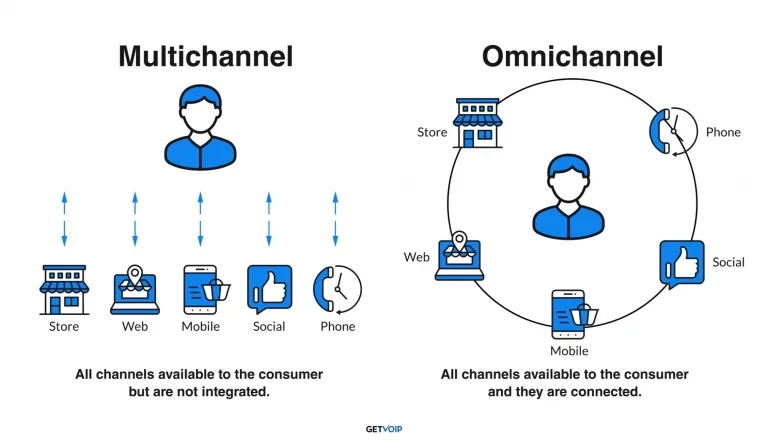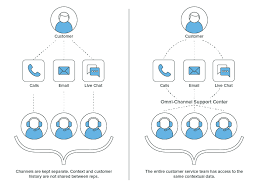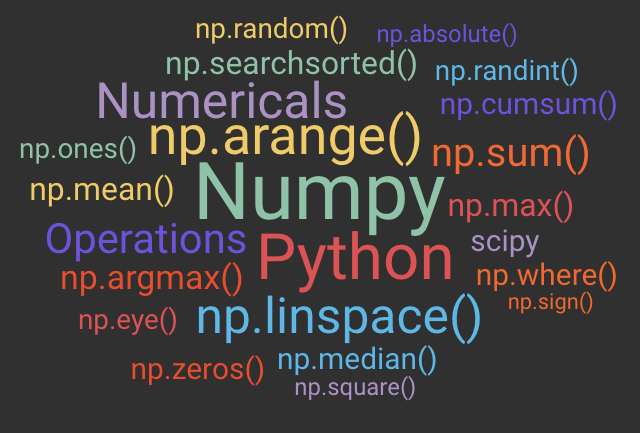What is the Difference Between Omnichannel and Multichannel?

Understanding the distinctions between omnichannel vs multichannel contact centers can help you make an informed decision and optimize your customer service strategy. Choosing the right contact center approach depends on your business goals and customer service objectives. If providing a unified, personalized, and seamless customer experience across channels is a priority, an omnichannel contact center is the ideal choice. On the other hand, if your main focus is handling high volumes of interactions on individual channels, a multichannel contact center may be a cost-effective solution.
Omnichannel vs Multichannel Contact Center
In today’s business world, having multichannel operations should be considered a basic requirement. However, it is the adoption of omnichannel strategies that businesses should aim for, as it represents the ideal approach to meeting customer expectations and staying competitive.
Embracing an omnichannel strategy is unquestionably the path to follow for any business aspiring to thrive and achieve long-term success. Providing a seamless experience is synonymous with delivering an enhanced customer experience.
Enhancing your internal operations results in improved efficiency and enables your contact center agents to deliver better service.
When your agents are capable of delivering superior service, it leads to customer satisfaction, making the effort invested in system changes worthwhile.
What is the difference between omnichannel and multichannel?
Multichannel marketing involves using different channels to deliver either the same content or unrelated content to customers. In contrast, omnichannel marketing leverages interactions across various channels to progress the customer journey at any given touchpoint. omnichannel vs multichannel contact center
What is omnichannel?
In essence, omnichannel customer service enables consistent and personalized experiences across all channels, with real-time visibility into customer interactions regardless of the channel used. On the other hand, multi-channel approaches involve separate silos of contact and interaction details, making it difficult for front-line staff to access up-to-date and accurate information.
Omnichannel vs Multichannel
In a multichannel approach, businesses employ various channels like physical stores, websites, social media, and mobile apps for customer service interactions. However, these channels often function independently, leading to a fragmented and inconsistent customer experience.
In contrast, an omnichannel approach strives to deliver a unified and integrated customer experience across all channels. Its primary goal is to establish a seamless brand presence, enabling customers to move effortlessly between channels while receiving consistent messaging and personalized interactions.
Omnichannel Multichannel Difference
If your objective is to offer a personalized and cohesive customer experience, implementing an omnichannel strategy can be advantageous. However, if your primary focus is to engage in targeted interactions on one channel at a time, a multi-channel contact center can still be highly effective.
Multichannel vs Omnichannel Example
Multichannel Example: A customer contacts a company’s call center for assistance with a product issue. Later, they send an email with additional questions, but the email support team does not know about the previous call, resulting in a disjointed experience for the customer.
Omnichannel Example: A customer initiates a live chat conversation on a company’s website. The chat agent has access to the customer’s previous interactions, including a recent social media inquiry and a phone call, allowing for a seamless and personalized conversation across channels.
What is a Multichannel Contact Center?

omnichannel vs multichannel contact center
Multichannel contact centers, which predate omnichannel ones, employ methods similar to those used in traditional contact centers. They support multiple independent communication channels, such as email, phone calls, social media, and chat. However, in a multichannel setup, the customer service representative handling a customer’s query on one channel is unaware of any previous interactions on other channels. This lack of visibility creates redundancy for the team and often frustrates customers, who may feel their issues are not being resolved. On the positive side, it allows customers to choose their preferred mode of communication.
What is an Omnichannel Contact Center?
In the context of omnichannel vs multichannel contact centers, omnichannel contact centers offer a seamless customer experience, which is highly sought after and essential for customer satisfaction. Derived from the Latin phrase “Omni,” meaning “all,” these centers enable customers to engage with representatives through multiple channels, with the advantage of all interactions being linked and visible within a single platform. By implementing universal queuing, they enhance personalization and provide access to every touchpoint in the customer journey.
For instance, customer information collected during interactions across calls, emails, and chats is accessible to any representative addressing the issue through a shared company database. This streamlines future communications and facilitates prompt responses to problems. The current person or team working on the issue can view all previous interactions and escalations. Key capabilities of omnichannel contact centers include end-to-end visibility of conversations, integration across channels, and a reduction in average handle time.
Autonomous omnichannel contact center
In an omnichannel contact center, automation is an inherent component designed to streamline operations and alleviate the workload on internal teams through the utilization of machine learning. It plays a crucial role in directing customers who require human assistance to customer service representatives by applying predefined guidelines. This automated approach proves particularly effective for large companies that handle substantial volumes of daily customer interactions.
Why Companies Use Contact Centers

omnichannel vs multichannel contact center
A contact center serves as a centralized hub for businesses to effectively manage and handle customer interactions. It enables companies to consolidate their customer communication by providing a unified point of contact for multiple channels, including phone calls, emails, live chats, and social media platforms.
Businesses use contact centers for several reasons:
- Increased customer satisfaction and loyalty due to improved customer service.
- Consistent support experience across all channels.
- Efficient handling of customer requests, reducing wait times, and improving productivity.
- Scalability to adjust resources and live agents to meet customer demands.
- Advanced analytics and reporting capabilities for performance monitoring and decision-making.
- Cost savings through efficient workforce management and reduced risk of mishandled interactions.
In summary, implementing a contact center enables businesses to provide a cohesive customer experience, enhance first-call resolution rates, and obtain valuable insights to inform strategic decision-making.
What Is an Omnichannel Contact Center?
An omnichannel contact center is a customer service system that integrates multiple communication channels, such as phone, email, social media, and live chat, into a unified platform.
With omnichannel contact center software, businesses can deliver a consistent and personalized customer experience across all channels, allowing customers to interact through their preferred channel while preserving the context of their interactions.
This enables customer support teams to effectively handle incoming and outgoing communications through various channels, ensuring a cohesive and seamless customer experience.
What is a Multichannel Contact Center?
A multichannel contact center is a centralized system or facility that enables organizations to engage with customers through various channels simultaneously. These channels can include phone calls, emails, live chat, social media platforms, and mobile applications.
Multichannel contact centers offer efficient and seamless support, allowing companies to effectively manage and address customer inquiries, issues, and requests across multiple communication channels.
While multichannel support centers can automate multiple channels of communication, they differ from omnichannel centers in that the communications are not interconnected. This means that agents may not have visibility into a customer’s previous interactions through other channels.
Differences Between Omnichannel vs Multichannel Contact Centers
Integration: Omnichannel: Fully integrated systems across all channels, while Multichannel: Silos between different channels
Context: Omnichannel contact centers provide complete customer history and journey data across various channels, while multichannel contact centers have limited cross-channel customer data.
Experience: Omnichannel contact centers strive to deliver a seamless and consistent experience across channels, whereas multichannel contact centers can feel disjointed in terms of customer experience.
Customer Focus: Omnichannel contact centers are customer-obsessed and prioritize service excellence, while multichannel contact centers have a more operational focus on delivering service.
Personalization: Omnichannel contact centers have the capacity for hyper-personalized service based on customer data and journey, whereas multichannel contact centers have limited capabilities for personalization.
Channels: Omnichannel contact centers support a wide range of channels, such as phone, email, chat, SMS, and social media, while multichannel contact centers typically focus on traditional channels.
Technology: Omnichannel contact centers utilize sophisticated, cloud-based systems with real-time customer data and AI capabilities, while multichannel contact centers often rely on basic call routing and legacy on-premise systems.
Cost: Omnichannel contact centers involve a higher upfront investment but drive long-term value, whereas multichannel contact centers have lower upfront costs but may be less future-proof.
Metrics: Omnichannel contact centers track 360-degree customer relationship metrics, while multichannel contact centers focus on channel-specific metrics only.
Best For: Omnichannel contact centers are well-suited for customer-centric teams focused on delivering a superior customer experience, while multichannel contact centers are more suitable for budget-conscious teams with a focus on handling high volumes of interactions.
Omnichannel vs Multichannel contact center: compare them in four key areas
1. Both omnichannel and multichannel setups involve the use of multiple communication channels for interacting with customers. These channels can encompass various methods, such as phone, email, live chat, social media, and more.
2. In an omnichannel contact center, agents handle customer interactions across multiple channels to provide comprehensive service. On the other hand, in a multichannel contact center, agents are assigned to specific channels, with one group specializing in phone support and another group managing communication on the brand’s social media channels.
3. An omnichannel call center solution employs a unified interface to manage all channels, while an omnichannel cloud contact center allows access from any internet-connected device. In contrast, a multichannel contact center may require agents to use separate applications for email support, web chat, and other channels.
4. Contact center structures can be categorized based on how data is managed within them. In omnichannel structures, customer data flows seamlessly across channels and is shared among them. On the other hand, in multichannel setups, data is isolated within individual channels and does not flow between them.
Advantages of Omnichannel and Multichannel Contact Centers

omnichannel vs multichannel contact center
Omnichannel contact center advantages
An omnichannel cloud contact center guarantees a consistent customer experience, regardless of the customer’s access point, be it through your website or physical store.
Customers can reach out to contact center agents through social media, and their messages will be seamlessly displayed on the agent’s screen, ensuring no important information is lost.
- Unified experience: A single platform that harmonizes customer interactions across physical and digital channels.
- Complete customer data: Agents are equipped with comprehensive knowledge of each customer’s history and touchpoints.
- Proactive engagement: Utilizing insights to anticipate customer needs and engage with them proactively, starting from the initial contact in the Interactive Voice Response (IVR) system.
- Emerging channels: Cloud-based architecture that enables swift integration of new channels, such as social media, SMS, and in-app messaging.
- Personalization: Leveraging customer data to deliver highly personalized service and tailored customer journeys.
Multichannel contact center advantages
Multichannel communication is most suitable when the customer experience does not involve multiple contact methods. Therefore, it is a cost-effective choice for companies looking to establish their initial contact center.
- Siloed channels: Phone, email, chat, and other channels operate as separate systems rather than being integrated.
- Limited customer data: Agents can only access customer history within the specific channel they are working on, which restricts their view to that channel alone.
- Channel-specific metrics: Metrics such as response time are measured individually for each channel rather than being evaluated holistically.
- Quick setup: Setting up a multichannel contact center is typically faster and simpler compared to the more intricate deployment process of an omnichannel system.
Omnichannel and Multichannel Contact Centers: Which is Best?
The choice between an omnichannel and multi-channel strategy depends on the specific goals and resources of your business.
If your objective is to deliver a unified and personalized customer experience, then an omnichannel strategy may be the preferred approach.
On the other hand, if your main focus is to have targeted interactions on a single channel at a time, a multi-channel contact center can still be highly effective in achieving your goals.
Multichannel omnichannel difference, Multi vs omni channel, Multi channel vs omnichannel, Difference between omni channel and multichannel, Difference between multichannel and omnichannel, omni channel multi channel difference, omnichannel vs multichannel marketing, https://nicheblink.com/omnichannel-vs-multichannel-contact-center/




